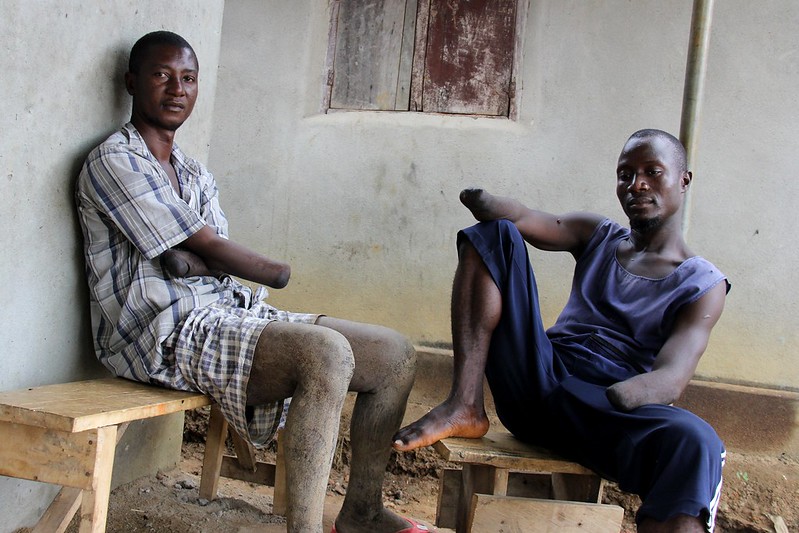Navigating Clean Water Access for Amputees in Sierra Leone
 Sierra Leone gained independence from the British empire in 1961 and, since emancipation, has faced extreme social and economic challenges. The Sierra Leonean Civil War, lasting from 1991 until 2002, was marked by the forceful amputation of the civilian population by the rebel soldiers. As many as 27,000 citizens are estimated to have had one or more of their limbs amputated during this time. In a population of approximately nine million people, about 70% are multidimensionally poor and only 10% have access to clean water. The prevalence of polluted water contributes to Sierra Leone’s ranking among countries having the lowest life expectancy in the world. Contaminated water sources increase the risk of diarrhea, respiratory infections, worm infections and malnutrition. Children are missing school to travel miles to collect water for their families. The water is most often polluted. This means that every year in Sierra Leone, over 1,200 children under 5 die from water-related diseases.
Sierra Leone gained independence from the British empire in 1961 and, since emancipation, has faced extreme social and economic challenges. The Sierra Leonean Civil War, lasting from 1991 until 2002, was marked by the forceful amputation of the civilian population by the rebel soldiers. As many as 27,000 citizens are estimated to have had one or more of their limbs amputated during this time. In a population of approximately nine million people, about 70% are multidimensionally poor and only 10% have access to clean water. The prevalence of polluted water contributes to Sierra Leone’s ranking among countries having the lowest life expectancy in the world. Contaminated water sources increase the risk of diarrhea, respiratory infections, worm infections and malnutrition. Children are missing school to travel miles to collect water for their families. The water is most often polluted. This means that every year in Sierra Leone, over 1,200 children under 5 die from water-related diseases.
Access To Clean Water for Amputees in Sierra Leone
Access to safe drinking water is limited even to individuals without disabilities. Therefore, it is even more severely limited for those who have lost limbs due to military amputation, mutilation or landmines that still reside under Sierra Leonean soil. Recently, The Borgen Project spoke with Sarah Hope, the founder of Elizabeth’s Legacy of Hope (ELoH), a charity that formerly gave prosthetics and support to amputees in Sierra Leone. Hope shared her recent visit to Sierra Leone with ELoH’s partner charity, World Hope International (WHI), highlighting the significant challenges faced by amputees. She noted, “It is very challenging for amputees. Many hundreds do not get given any form of prosthetics at all and mobility is almost impossible. Their legs are sore and painful and it is very difficult for them to get around.”
Thousands in Sierra Leone have experienced limb loss either as a result of the Civil War or due to landmines. However, small cuts and grazes also frequently contribute to amputations. Sarah explained, “When children graze themselves playing, their legs become infected and their parents take them to witch doctors. Wounds become infected and this can lead to amputation.”
People with disabilities often face challenges in collecting water. “Sometimes there are taps in villages, but often it is shared between far too many people and is inaccessible for amputees,” shared Hope. The drainage systems are inadequate when it rains. Therefore, spaces become flooded and roads impassable: “The water on the ground becomes dirty and extremely difficult for amputees to navigate around. It has often been washed up from a drain, mixed with soil and sewage. If they do not have clean water, they often must boil it first.” This presents another challenge. “In fact, I would say it is almost impossible for amputees to collect water. If they do not have a prosthetic leg on, they cannot walk to collect water. Even if they have crutches to help them walk, they do not have the arms to carry it.” On her recent visit, Hope shared she met many amputees who “do not go to school as their society believes that disabled children are not worth educating.”
Looking To the Future
Since 2018, WHI and ELoH have worked together to fund Enable the Children, a project that has successfully provided physiotherapy and occupational care to more than 1,000 disabled children in Freetown, Sierra Leone. The initiative works with schools, communities and families to ensure vital developmental support for child amputees.
In December 2020, the Freetown-Blue Peace project was launched collaboratively by the Freetown City Council (FCC), the Swiss Agency for Development and Cooperation (SDC) and the United Nations Capital Development Fund (UNCDF). This positive initiative aims to leverage innovative financial approaches to create sustainable water access in Sierra Leone. It acknowledges sufficient access to water as an intervention to prevent conflict and build peace. The project has facilitated the establishment of 25 public restrooms and 40 water kiosks in the country’s capital city.
When Sierra Leone hosted elections in 2023, the Water, Sanitation and Hygiene (WASH) organization actively advocated for parliamentarians, mayors, district chairmen and local councilors to prioritize drinking water. Through intensified advocacy, WASH succeeded in making 258 candidates across the political spectrum pledge to prioritize clean water in their proposed agendas. Historically, political advocacy has demonstrated its capacity to bring about positive change, as evidenced by the creation of a Ministry of Water Resources in the aftermath of Sierra Leone’s 2013 election.
Conclusion
Access to clean water is an essential part of all human life. Without clean water, we cannot survive. It should be freely and readily available, not seen as a luxury. Supporting vital fundraising efforts like these will brighten the future for all amputees in Sierra Leone.
– Sapphire Hope
Photo: Flickr
